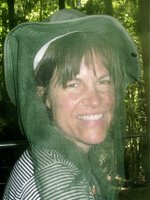In a media release optimistically entitled “Here comes the clean-up army,” CRC CARE is promoting a book of articles about the possibilities of “clever trees, smart shrubs, cunning grasses and designer fungi” that may be used to produce “truly clean cities for the first time since cities were built.”
For only $230 you can buy “Trace Elements in the Environment,” edited by Ravi Naidu. For free you can learn more about it at www.ScienceAlert.com.au.
That web site is edited by Julian Cribb who published a related but less optimistic article recently in “The Australian” newspaper about how a reduction in rainfall due to climate change may bring back to this continent something it seems to have had not so long ago -- a plague of flies.
Flies used to be so bad here that eating outdoors in the summertime could be a health hazard and sweaty backs would be quickly covered. The plague may return if the worst-ever drought continues.
Plop, plop
Why? Because dung beetles need rain-softened soil in order to bury the 270 million cow patties that plop down on Aussie dirt every day. Left on top of the ground, each of these bovine gifts, Cribb writes, can produce 3,000 flies within two weeks. Let’s see… 270 million times 3,000 times the number of hot days each years equals: a lot of flies.
There’s no plague of flies here now but, sometimes and in some places, flies can be bad enough to encour
 age the sale of not-so-cool hats with drop-down nets that keep flies off one’s face and neck. A couple of those green hats made hiking north of Sydney possible for me and my wife last summer.
age the sale of not-so-cool hats with drop-down nets that keep flies off one’s face and neck. A couple of those green hats made hiking north of Sydney possible for me and my wife last summer.Without nets dangling from our hat brims, we’d have been driven batty by Blue Mountain flies, but according to Cribb we ain’t seen nuthin’ yet if the worst drought in Australia’s history turns out to be non-transitory, a permanent feature of climate change. Too much dry, hard dirt and our beetle friends are shut down.
The relatively fly-less life we enjoy is due to an expert in beetles who introduced the little dung collectors here forty some years ago in a program that Cribb says is probably “the greatest recycling enterprise in our national history.”
George B’s beetles
It may not be wise to consider too closely why these beetles choose to ball up and bury cow poop, but the result for humankind is the enrichment of pastures as well as the removal of millions of fly nurseries. The increased yields of meat, milk, and wool should have made this scientist’s name an Aussie household word, except that his business card read: George Boremissza, coleopterist.
George B’s program was axed after a couple of decades and Cribb says dung beetle science here is dead as the dodo, with only a few scientists trying to figure out what to do if the beetles can’t continue to silently, daily, diligently save our necks from flies.
It’s not the kind of science we do these days, Cribb says, in part because it doesn’t generate intellectual property that can create profit. Trees, grasses, and fungi that may absorb pollutants in the soils of our cities, it seems, have greater corporate income potential.
So, are we headed for cleaner cities that are fly-blown?
It showered yesterday in our part of Brisbane. Not enough to help a beetle, I fear. Just enough to darken the pavement, but a reminder that rain may someday return.
Meanwhile, though, with reservoirs at 30% of capacity or less, one hears few Australians poo-pooing global warming and its effects. And I’m thinking about how to make a hat with a drop-down net that reaches to the ankles.
Or, of course, we could all become vegetarian. Fewer beef eaters = fewer cows. Fewer cows = fewer plops. Fewer plops = fewer flies. Eat your veggies; save the world.
Maybe I’ll write a book about that idea, which I hereby claim as intellectual property. Maybe I’ll publish it myself. Maybe I’ll offer it for $230 a copy. Or maybe I’ll just do a rain dance. What do you suggest?